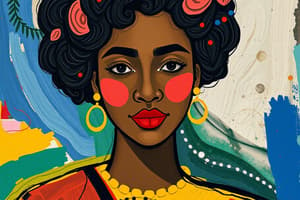Podcast
Questions and Answers
Very few minority groups are included in clinical trials for empirically supported treatments.
Very few minority groups are included in clinical trials for empirically supported treatments.
True (A)
What must empirically supported treatments (ESTs) demonstrate to be considered effective?
What must empirically supported treatments (ESTs) demonstrate to be considered effective?
Superiority to placebo in two or more controlled studies
Which of the following are considered empirically supported relationship variables?
Which of the following are considered empirically supported relationship variables?
- Strong interpersonal bond
- Strong therapeutic alliance
- Effective management of countertransference
- All of the above (correct)
Which of the following has been described as the three major categories of cultural barriers that can lead to an ineffective helping relationship with culturally diverse clients?
Which of the following has been described as the three major categories of cultural barriers that can lead to an ineffective helping relationship with culturally diverse clients?
During the resistance and immersion stage, the three most active types of affective feelings are guilt, shame, and anger.
During the resistance and immersion stage, the three most active types of affective feelings are guilt, shame, and anger.
Culturally adapted ESTs have been successfully used with Asian Americans experiencing phobias.
Culturally adapted ESTs have been successfully used with Asian Americans experiencing phobias.
Feelings of being brainwashed by the forces of White society would most likely be found in what stage of REC identity developmental model?
Feelings of being brainwashed by the forces of White society would most likely be found in what stage of REC identity developmental model?
When counselors unwittingly impose monocultural standards without regard for differences in lifestyles and cultures, they may be engaging in:
When counselors unwittingly impose monocultural standards without regard for differences in lifestyles and cultures, they may be engaging in:
The basic building blocks of cultural competence in clinical practice are _____, _____, and _____ .
The basic building blocks of cultural competence in clinical practice are _____, _____, and _____ .
Covert sexism is:
Covert sexism is:
Which of the following is an example of an environmental microaggression?
Which of the following is an example of an environmental microaggression?
The myth of the 'model minority' has often played into major misunderstanding between Black and Asian communities.
The myth of the 'model minority' has often played into major misunderstanding between Black and Asian communities.
To be a culturally competent therapist, one should avoid personal feelings and previous experiences with race, culture and gender.
To be a culturally competent therapist, one should avoid personal feelings and previous experiences with race, culture and gender.
Inheriting negative feelings and beliefs about members of marginalized groups is:
Inheriting negative feelings and beliefs about members of marginalized groups is:
Most of the mental health disorders in the DSM-5 are transcultural.
Most of the mental health disorders in the DSM-5 are transcultural.
Which counselors explore their own emotional reactions to race and culture, feelings such as defensiveness and anger can be destructive and are better left untouched.
Which counselors explore their own emotional reactions to race and culture, feelings such as defensiveness and anger can be destructive and are better left untouched.
The statement 'There is only one race: the human race' is an example of:
The statement 'There is only one race: the human race' is an example of:
An effective curriculum should allow students to understand feelings of helplessness and powerlessness.
An effective curriculum should allow students to understand feelings of helplessness and powerlessness.
Shame is an emotion felt at the group level, whereas guilt is an individual emotion.
Shame is an emotion felt at the group level, whereas guilt is an individual emotion.
Which ego status would be best represented by the following statement, 'My grandfather is prejudiced, but I try not to be?'
Which ego status would be best represented by the following statement, 'My grandfather is prejudiced, but I try not to be?'
Which of the following statement is NOT true about racism?
Which of the following statement is NOT true about racism?
Which of the following has been described as a challenge faced by counselors in treating culturally diverse populations?
Which of the following has been described as a challenge faced by counselors in treating culturally diverse populations?
Many immigrants are from collectivistic orientation.
Many immigrants are from collectivistic orientation.
The burden to become multiculturally competent rests on the trainees from dominant culture.
The burden to become multiculturally competent rests on the trainees from dominant culture.
Which of the following is likely to be a perspective of a culturally competent helping professional?
Which of the following is likely to be a perspective of a culturally competent helping professional?
Research suggests that it is possible for people to avoid inheriting the racial biases, prejudices, misinformation, deficit portrayals, and stereotypes of their forebears.
Research suggests that it is possible for people to avoid inheriting the racial biases, prejudices, misinformation, deficit portrayals, and stereotypes of their forebears.
The R/CID model can be considered a global personality theory, which provides fixed and identifiable phases that serve to identify where clients fit on a spectrum.
The R/CID model can be considered a global personality theory, which provides fixed and identifiable phases that serve to identify where clients fit on a spectrum.
The three types of resistance that are often encountered by students studying diversity training are:
The three types of resistance that are often encountered by students studying diversity training are:
The effectiveness of White therapists is related to their ability to overcome sociocultural conditioning and to make their Whiteness invisible.
The effectiveness of White therapists is related to their ability to overcome sociocultural conditioning and to make their Whiteness invisible.
The approximate number of the foreign-born population including undocumented immigrants living in the United States is:
The approximate number of the foreign-born population including undocumented immigrants living in the United States is:
The authors contend that there is a denial associated with being White, and it is related to the denial of White privilege.
The authors contend that there is a denial associated with being White, and it is related to the denial of White privilege.
According to the Hardiman (1982, as cited in Sue 9th edition) White Racial Identity Development model, which stage is characterized by a conscious belief in the democratic ideal that everyone has an opportunity to succeed?
According to the Hardiman (1982, as cited in Sue 9th edition) White Racial Identity Development model, which stage is characterized by a conscious belief in the democratic ideal that everyone has an opportunity to succeed?
Cognitive behavioral therapy, but not psychodynamic therapy, includes many components of White culture.
Cognitive behavioral therapy, but not psychodynamic therapy, includes many components of White culture.
Ableism has received limited attention in the literature on modern forms of oppression.
Ableism has received limited attention in the literature on modern forms of oppression.
Graduate programs tend to shy away from teaching about antiracism because there is a limited amount of literature on the topic.
Graduate programs tend to shy away from teaching about antiracism because there is a limited amount of literature on the topic.
Familismo refers to:
Familismo refers to:
Only White individuals need to learn cultural competence.
Only White individuals need to learn cultural competence.
The client becomes a symbol of the inherent mistrust that exists in majority-minority relationships is a characteristic of which challenge associated with counseling White clients?
The client becomes a symbol of the inherent mistrust that exists in majority-minority relationships is a characteristic of which challenge associated with counseling White clients?
Which of the following are components of White culture?
Which of the following are components of White culture?
The client/therapist interchange between Dr. D and Gabriella presented in Chapter 2 provides the reader with a good example of a multiculturally competent therapist addressing a concern of a client from another cultural group.
The client/therapist interchange between Dr. D and Gabriella presented in Chapter 2 provides the reader with a good example of a multiculturally competent therapist addressing a concern of a client from another cultural group.
Minority clients most likely terminate prematurely from therapy sessions because they realize they actually do not need the help.
Minority clients most likely terminate prematurely from therapy sessions because they realize they actually do not need the help.
Which of the following is NOT a relevant question for counselors to ask?
Which of the following is NOT a relevant question for counselors to ask?
Preparing counselors with multicultural expertise means:
Preparing counselors with multicultural expertise means:
Beliefs such as 'we are all part of the human race' and 'I do not see color' are most helpful in establishing empathy between the therapist and clients of color.
Beliefs such as 'we are all part of the human race' and 'I do not see color' are most helpful in establishing empathy between the therapist and clients of color.
Rushing to help a disabled person onto public transportation could potentially signal to them that:
Rushing to help a disabled person onto public transportation could potentially signal to them that:
In which stage does the person of color realize racism exists?
In which stage does the person of color realize racism exists?
According to the authors, minority therapists working with White clients should avoid acknowledging their racial differences because it can cause tension and division.
According to the authors, minority therapists working with White clients should avoid acknowledging their racial differences because it can cause tension and division.
Which stage has the most profound negative impact on nearly all people of color?
Which stage has the most profound negative impact on nearly all people of color?
Which of the following is considered a shortcoming of empirically supported treatments?
Which of the following is considered a shortcoming of empirically supported treatments?
Empirically supported treatments must demonstrate:
Empirically supported treatments must demonstrate:
The journey to becoming a competent culturally sensitive counselor in working with diverse populations is not complex.
The journey to becoming a competent culturally sensitive counselor in working with diverse populations is not complex.
Of the approximately 40 million of the foreign-born population currently living in the United States, how many are considered unauthorized immigrants?
Of the approximately 40 million of the foreign-born population currently living in the United States, how many are considered unauthorized immigrants?
Which of the following is an empirically supported relationship variable?
Which of the following is an empirically supported relationship variable?
Flashcards are hidden until you start studying
Study Notes
Cultural Barriers and Helping Relationships
- Three Major Categories of Cultural Barriers: Culture-bound values, language variables, and class-bound values.
- Culturally Adapted ESTs have been successfully used with Asian Americans experiencing phobias.
Cultural Competence
- Building Blocks of Cultural Competence: Knowledge, skills, and awareness.
- Cultural Oppression: Unwittingly imposing monocultural standards without considering diverse lifestyles and cultures.
- Covert Sexism: Unequal and harmful treatment of women conducted in a hidden manner.
- Environmental Microaggressions: Examples include a lack of Braille in elevators or a male coworker displaying inappropriate imagery in their workspace.
Racial Identity Development
- Resistance and Immersion Stage: Characterized by feelings of guilt, shame, and anger.
- The Myth of the "Model Minority": Contributes to misunderstandings between Black and Asian communities.
- Inheriting Negative Feelings and Beliefs: Unavoidable due to the socialization process and its influence on attitudes and stereotypes.
- R/CID Model: Provides a framework for understanding racial identity development and its implications for individuals and society.
White Racial Identity Development
- Naiveté Stage: Characterized by a belief in the democratic ideal that everyone has equal opportunity to succeed without acknowledging systemic inequalities.
- Denial of White Privilege: Refers to the denial associated with being white, which often contributes to the perpetuation of inequality.
Counseling Diverse Populations
- Challenges Faced by Counselors: Understanding worldviews, cultural values, life circumstances, and managing linguistic barriers.
- Importance of Acknowledging Racial Differences: Acknowledging racial differences is crucial for fostering trust and understanding in the therapeutic setting.
- Multicultural Competence in Therapists: Emphasizes broadening the role of a counselor to include teaching, consulting, and advocacy.
- Empirically Supported Treatments (ESTs): While valuable, ESTs often lack representation of minority groups, impacting their generalizability and effectiveness.
- Therapist's Emotional Reactions: Exploring personal feelings and past experiences with race, culture, and gender is essential to understand potential unconscious biases.
- Empirically Supported Relationship Variables: Include a strong interpersonal bond, a strong therapeutic alliance, and effective management of countertransference.
- Minority Therapists and White Clients: Should be aware of the potential challenges in establishing trust and understanding due to historical power dynamics.
Key Concepts and Terms
- Ableism: Discrimination and prejudice against people with disabilities.
- Familismo: Emphasis on family loyalty, unity, and extended family bonds in Latinx cultures.
- Colorblindness: The belief that ignoring racial differences promotes racial harmony, but can be a form of denial of systemic inequalities.
- Antiracism: The active opposition to racism and the systemic structures that perpetuate it.
Additional Notes
- Foreign-born population in the US: Over 35 million, including unauthorized immigrants.
- Multicultural Competency: Requires ongoing personal and professional development.
- Cultural Values: Understanding and respecting diverse cultural values is essential for effective counseling.
- Trauma-Informed Care: Recognizing the impact of trauma and adversity on individuals and communities, particularly those who have experienced oppression.
- Social Justice: Advocate for equal rights, opportunities, and resources for all.
Studying That Suits You
Use AI to generate personalized quizzes and flashcards to suit your learning preferences.




